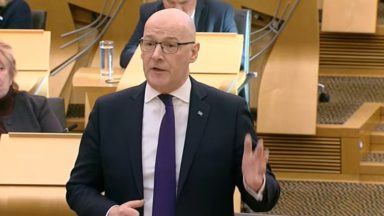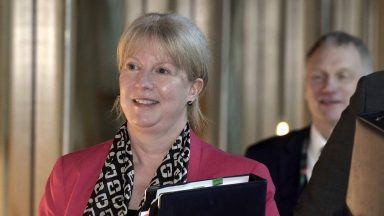The Scottish Government did not put new complaints procedures in place in order to “get Alex Salmond”, Scotland’s top civil servant has said.
Permanent secretary Leslie Evans forcefully denied that the policy, updated at the end of 2017 in the wake of the Me Too movement, had been “engineered” to target the former first minister.
She was speaking at the opening session of the Holyrood inquiry into how the Scottish Government handled the initial harassment complaints against Salmond.
Claims of sexual misconduct against him, made by two women in early 2018 but which dated back to 2013, came shortly after the Scottish Government reformed its internal complaints policies.
But Salmond took the Scottish Government to court and won more than £512,000 in damages in a civil case, with a judge ruling the actions of government officials had been unlawful and “tainted with apparent bias”.

Speaking on Tuesday, Ms Evans said she apologised “unreservedly” for a “procedural failure” in one aspect of the new policy which resulted in Salmond’s successful court action.
But she insisted that investigating the harassment complaints against the former first minister was the “right thing to do”.
The complaints, while not directly related, ultimately triggered Police Scotland’s separate investigation into Salmond, leading to a criminal trial.
He was cleared of 13 charges of sexual offences by a jury in the High Court in March.
Salmond’s allies believe the botched internal case – and the criminal investigation and charges which followed – are evidence of a politically-motivated conspiracy against him.
But asked at the inquiry if the new complaints procedure has been specifically designed to “get” Salmond, Ms Evans replied: “Absolutely not.”
In her opening statement, she said: “When complaints were raised it would have been unconscionable, and a failure in our duty of care, not to investigate those complaints.
“It was accepted at judicial review that one part of our procedure should have been applied differently.
“I apologise unreservedly to all concerned for this procedural failure.”
She said the Scottish Government had already learned lessons from the failings during the Salmond case.

The permanent secretary claimed the government “is and remains ahead of many other institutions” in designing procedures appropriate to dealing with harassment complaints and, particularly, historic sexual misconduct claims.
She continued: “The Scottish Government has been on a journey of cultural change since 2015 to ensure the organisation is more open, capable and responsive.
“As permanent secretary, I have led a focus on equality, inclusion and wellbeing, including addressing bullying and harassment.”
Ms Evans confirmed that one of the complainers against Salmond had been shown a draft of the new complaints policy before it was signed off.
She said it was “not unusual” for someone with “lived experience” to be consulted in such a way, and stated: “I don’t believe there were any changes made as a result of that.”
The Scottish Government’s case in the Court of Session in 2019 collapsed when it emerged that the investigating officer appointed to handle the complaints internally had previously had contact with both complainers.
Officials defended this contact as amounting to “welfare support and guidance” but it was in breach of the government’s own rules.
Ms Evans insisted on Tuesday: “It remains the case that the investigation of those complaints was the right thing to do.”
She concluded her statement by saying: “By creating the culture and environment in which complaints of this nature could be raised and in which subsequent investigation of those complaints could take place, the Scottish Government did not take the easy path – but it is the right one.”
Following the outcome of the Court of Session civil case in January 2019 – which prompted the Holyrood inquiry into existence – Salmond and his supporters called for Ms Evans’ job.
However, First Minister Nicola Sturgeon, who ultimately signed off on the change to the complaints policy in December 2017, has always stood by her permanent secretary.
Salmond, Sturgeon, deputy first minister John Swinney and a swathe of past and present officials are expected to give evidence under oath to the special Scottish Parliament committee.
Follow STV News on WhatsApp
Scan the QR code on your mobile device for all the latest news from around the country



























